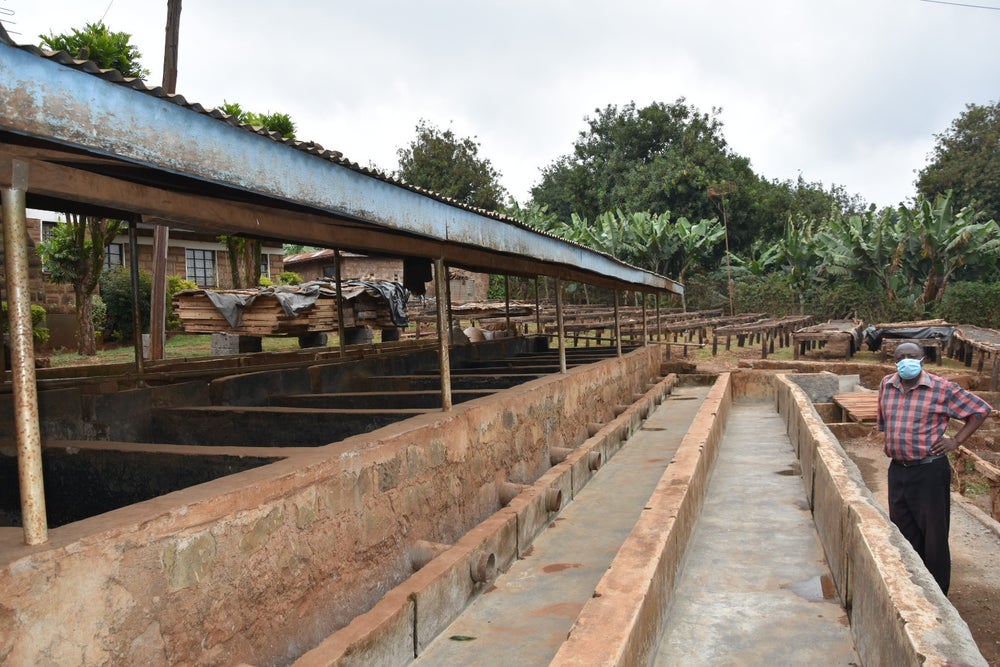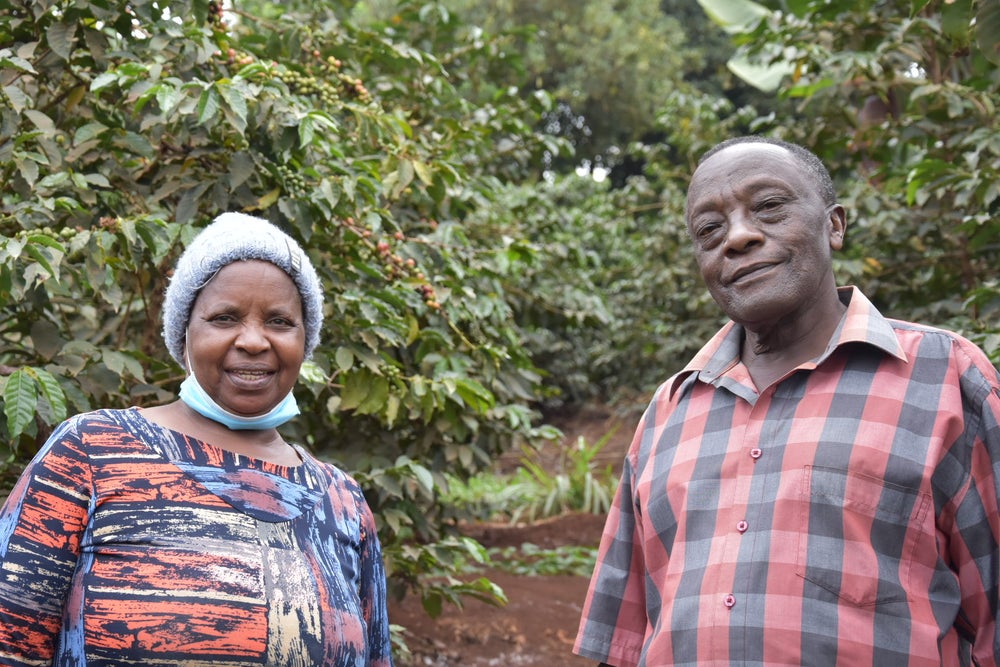About This Coffee
Danson Wanyutu Karugondo and his brothers - Geoffrey, Bernard and Eliud - cultivate and process this Fully washed coffee on their farm, Docha Estate. The estate sits at 1,650 to 1,850 meters above sea level in Kenya’s Kiambu County, just a stone’s throw from Nairobi – 15 km to be exact!
The brothers grew up on Docha Estate and learned coffee production from their parents. Danson oversees much of the work and uses organic manure from his cows and chickens to improve the quality of their coffee. They were among the original members of the Ngewa-Komothai group and have worked with Sucafina/Kahawa Bora over the years on improving various aspects of their production. They have done such an amazing job increasing both yields and quality that they're now able to market the coffee under their own names.
Cultivation
Kiambu county has deep red volcanic soils, rich in organic matter and perfect for coffee farming.
Danson makes the most of this. The farm is planted with a mix of ‘traditional’ SL34 and SL28 coffee trees. He works the farm himself - along with a bit of help - with great diligence. The ‘SL’ varieties were cultivars originally released by Scott Agricultural Laboratories (SAL) in the 1930s and 1940s. They soon became the go-to trees for many growers in Kenya due to their deep root structure, which allows them to maximize scarce water resources and flourish even without irrigation. Along with the more recently developed Ruiru-11, these varieties are virtually ubiquitous in Kenya today.
Danson receives regular training from Sucafina in Good Agricultural Practices, including fertilizer application, pruning guidance and renovation advice, which helps him to keep his small farm in optimal condition. His years of working with Sucafina has enabled him to improve yields and quality, and he looks forward to his hard work paying off by creating new relationships with roasters.
Harvest & Post-Harvest
Docha is categorized as a ‘small estate’ in Kenya. This sector has, until recently, been frequently overlooked.
Traditionally, many farmers of this size in Kenya did not own their own processing equipment. They have historically delivered cherry to a centralized cooperative-owned ‘Factory’ (as washing stations are called, locally), where their production is combined with that of others from their region. Danson, however, has his own, small wet mill where he is able to process his own coffee, ensuring full traceability back to his farm.
Cherry is selectively handpicked and then pulped. Coffee is then fermented for 12 to 24 hours in a small tank before being washed in clean water to remove any remaining mucilage. All wastewater from the washing process is cleaned to ensure their environmental impact is limited.
Parchment is soaked for 12 hours and then transferred to raised beds where it sundries for 14 to 21 days. As it dries, parchment is turned regularly to ensure even drying.
Even for farmers who may have their own processing setup, the dry-milling setup within Kenya does not well serve small-to-medium size farmers. Dry mills have lot minimums, which are usually about 50 bags of parchment per lot. This is often unattainable for smaller farmers, necessitating that they merge their lots with others, losing traceability. Lost traceability in turn lowers their overall returns and removes the potential for name recognition and direct-trade relationships.
To cater for single producer lots that are very small, Kahawa Bora/Sucafina has a separate microlot milling line that was custom-made to hull (remove the parchment from the green coffee beans) lots as small as one bag at a time. This line makes it possible for growers to maintain their own ‘brand’ when selling their coffee. We feel this is a push in the right direction for Kenyan growers to gain market access to quality-focused buyers overseas.
About Kiambu
Kiambu is right outside Kenya’s capital city of Nairobi but is nonetheless known for agriculture – specifically coffee and tea. The county is also home of the Kenyan Coffee Research Foundation.
Kiambu County is also well known for its dairy production, and is the largest dairy producing county in Kenya. Many of the growers here adhere to organic fertilizing practices, using only cow manure instead of agrochemicals on their coffee trees.
Farmers in Kiambu face low production due to pests and disease while simultaneously having to pay high prices for inputs. In recent years, many have felt the strain and have sold their land to real-estate developers looking to build on the edge of Nairobi.
AA Grade
Kenyan coffees are classified by size. AA beans are the largest size. AA grade coffees are those that are 17/18 screen size, meaning that they are larger than 7.2 millimeters.
Coffee in Kenya
Though coffee growing had a relatively late start in Kenya, the industry has gained and maintained a impressive reputation. Since the start of production, Kenyan coffee has been recognized for its high-quality, meticulous preparation and exquisite flavors. Our in-country sister company, Sucafina Kenya, works with farmers across the country to ensure these exceptional coffees gain the accolades they deserve.
Today, more than 600,000 smallholders farming fewer than 5 acres compose 99% of the coffee farming population of Kenya. Their farms cover more than 75% of total coffee growing land and produce nearly 70% of the country’s coffee. These farmers are organized into hundreds of Farmer Cooperative Societies (FCS), all of which operate at least one factory. The remainder of annual production is grown and processed by small, medium and large land estates. Most of the larger estates have their own washing stations.
Most Kenyan coffees are fully washed and dried on raised beds. The country still upholds its reputation for high quality and attention to detail at its many washing stations. The best factories employ stringent sorting practices at cherry intake, and many of them have had the same management staff in place for years.

